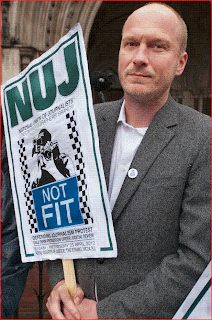 Channel 4 News
Channel 4 News chief correspondent, Alex Thomson (top), has revealed he has been physically threatened by a Scottish journalist in a hostile media atmosphere in Glasgow during his current investigation into the tangled financial affairs of Rangers FC.
Thomson, who has covered 20 wars across the globe in his 22 years with
Channel 4 News, claims that asking questions about Rangers FC “clearly angers some in the Glasgow media in a way I’ve never seen in 25 years of global reporting."
The broadcaster, who has been reporting on screen in the past two weeks on the Rangers FC crisis, has also written a number of
controversial blogs on the
Channel 4 News website which has sparked off a deluge of comments online.
In one blog, he asks why nobody saw Sir David Murray’s Rangers empire was crumbling, and nobody at the club, the ScottishFootball Association and the ScottishPremier League questioned whether current owner Craig Whyte really was the man to buy Rangers FC.
And he answers: “Because – like the bankers – everyone was having too much fun living the dream? Partly yes, but partly a crucial check and balance to all the Ibrox hype had all but gone.
“For years too much football ‘journalism’ in Glasgow had been too lazy, sycophantic and incapable of asking awkward questions.”
In one blog, Thomson explains: “I’d expected the paranoia, insults, spin etc – hey – this is ‘fitba’ after all and I welcome it good, bad and ugly, from fans within and without Glasgow. Indeed I’ve gone out and asked for it.
“What I didn’t expect were the insults (and in at least one case a direct physical threat) not from fans but from Scottish journalists.
“Sarajevo, Mogadishu, Kabul, Islamabad, Tripoli, Baghdad…I could bore you with more – in none of these places have I ever got this interesting reaction from local journalists.
“Only in Glasgow. So something’s up. Something’s different. Something about asking questions about RFC clearly angers some in the Glasgow media in a way I’ve never seen in 25 years of global reporting.
He does add: “Equally, a number of fine Glasgow journalists have been incredibly helpful, encouraging and agree there has been something deeply wrong for far too long in the culture of reporting RFC."
Thomson has also posted: "The culture of taking wild stories at face value and pumping them out appears alive and well in Glasgow – the record will show the MSM in that city have been left standing time and time again by bloggers getting the facts in their spare time often many miles from Glasgow.
"Media studies PhD anyone? Tis fertile ground."



























